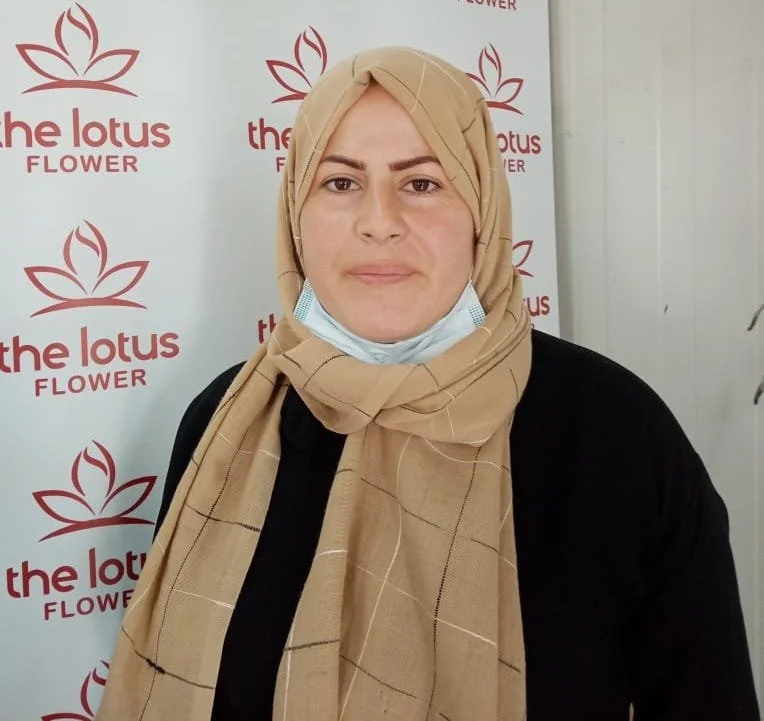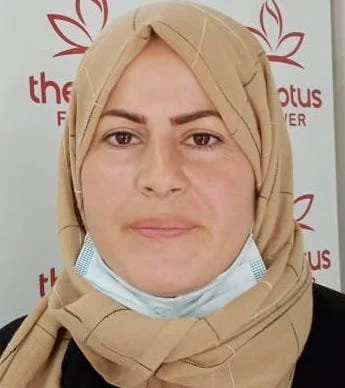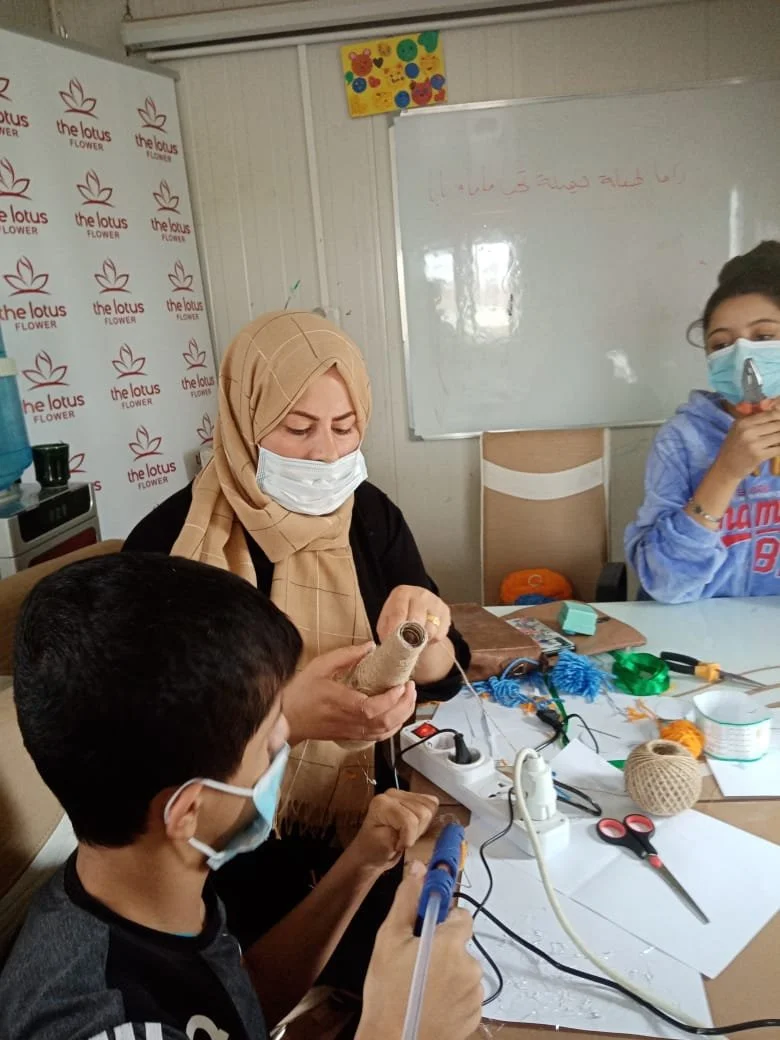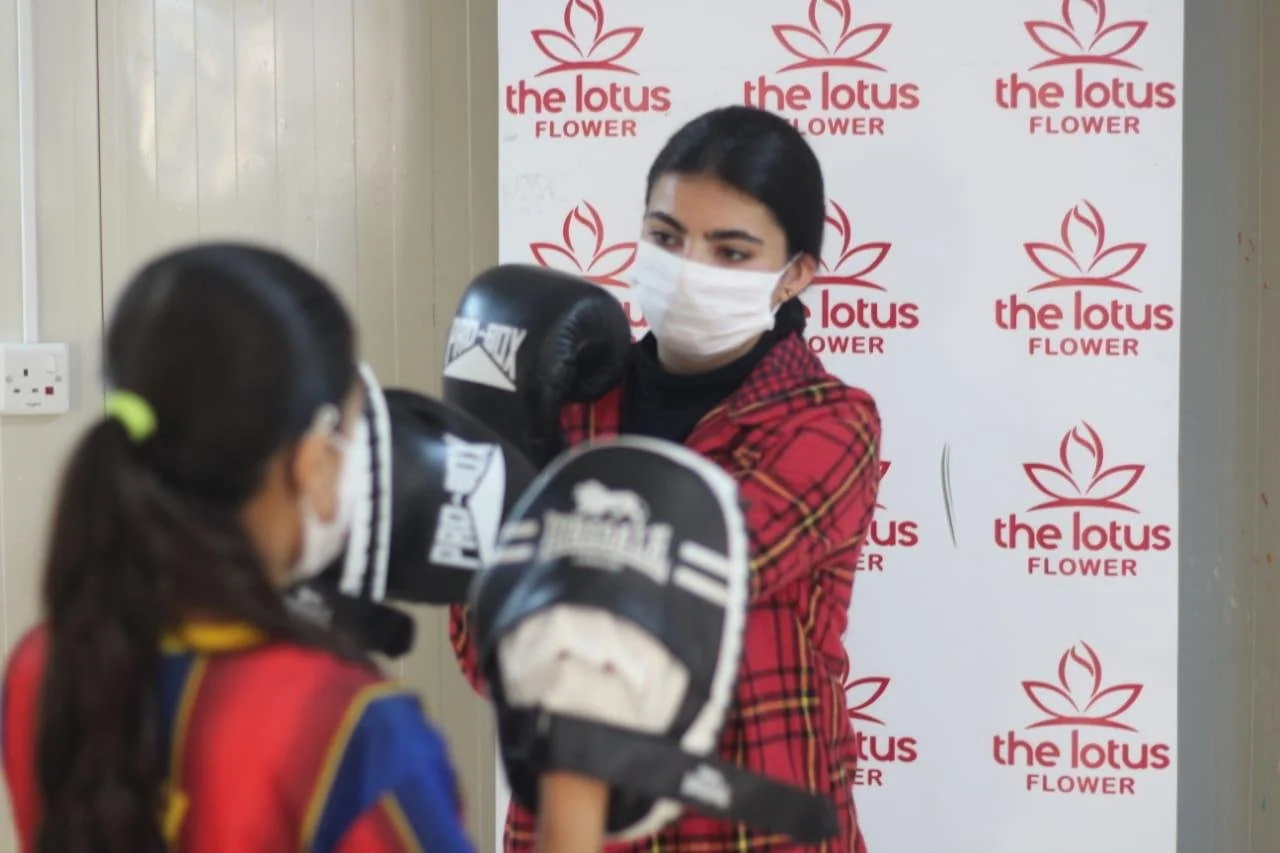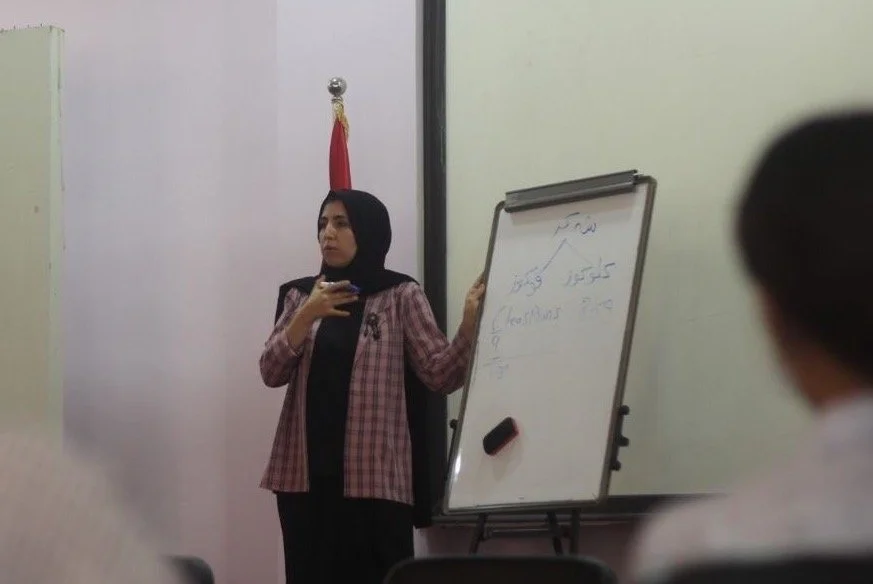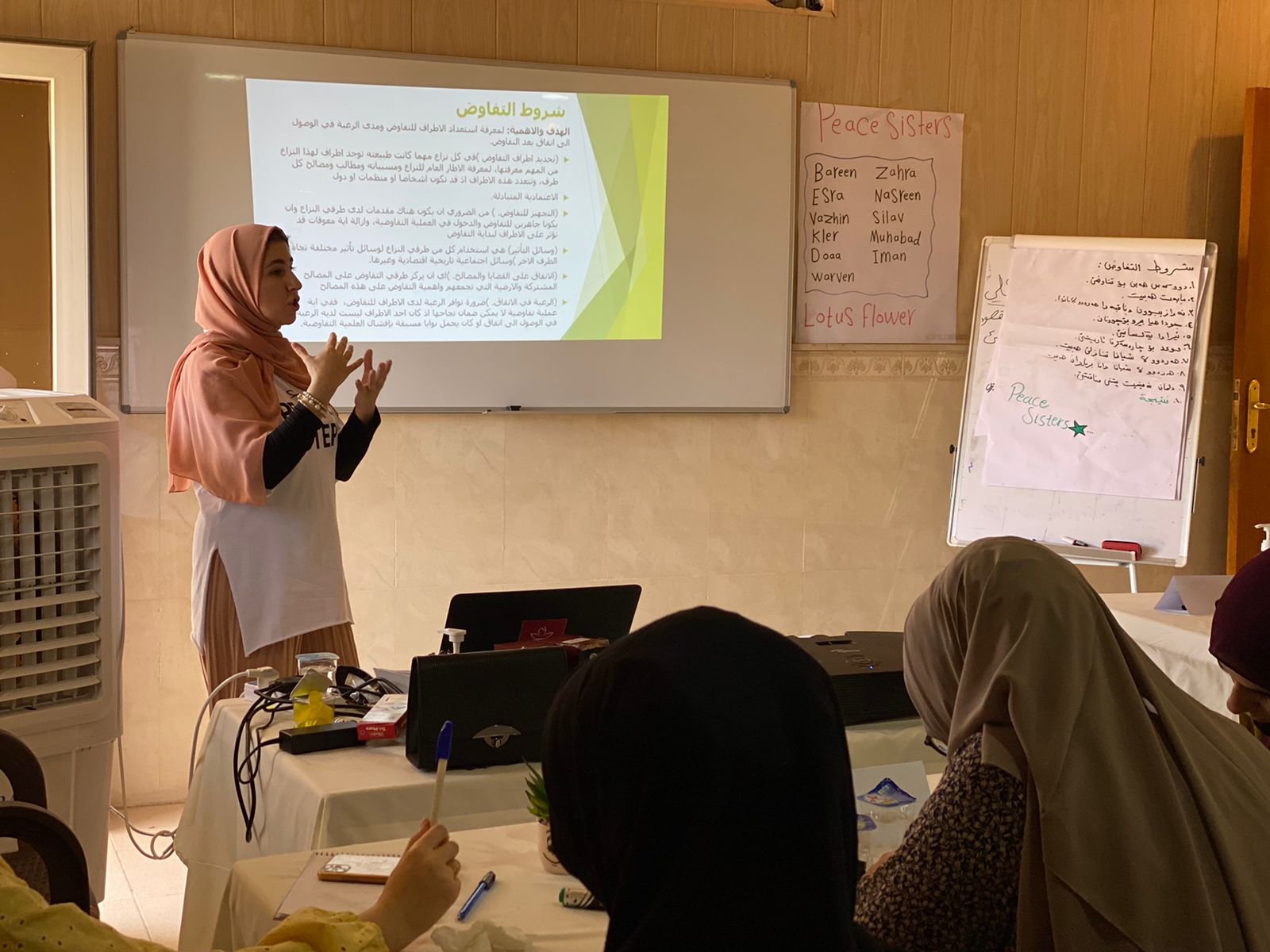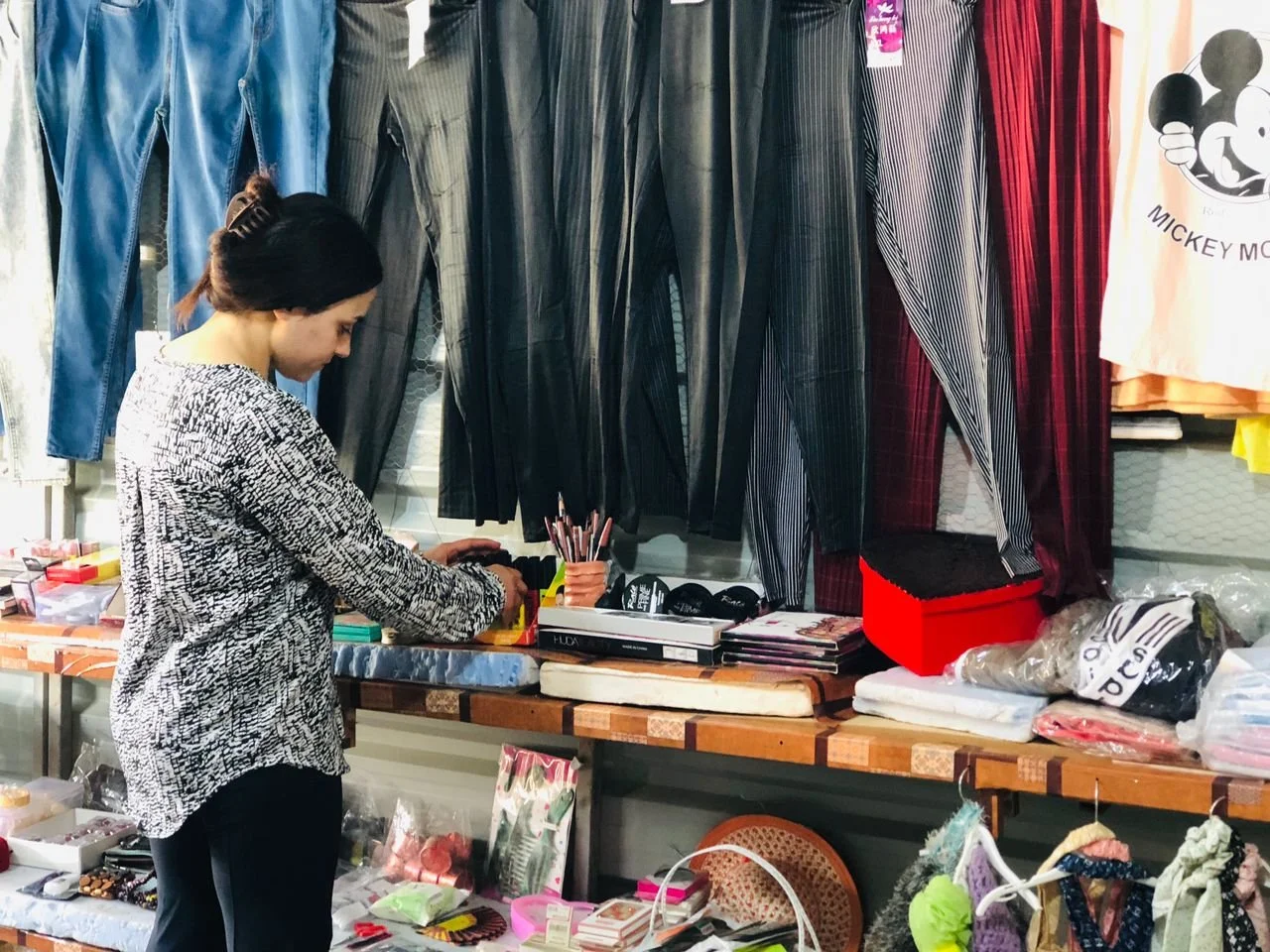Sisters' Stories: Working through the mental health crisis
The Lotus Flower works continually to provide mental health support for displaced women and girls – but as you can imagine, there’s so much more to do if we are to reach all of those in need.
Not only are the women and girls we support still traumatised following years of conflict, but the pandemic has caused a huge spike in conditions such as anxiety and depression. Many women have lost their main sources of income and are struggling to provide for their families, and there’s also been a significant rise in gender-based violence and abuse in refugee and IDP communities. Life in camp can also feel very isolating – especially when so many women and girls have no idea when they will be able to safely return home.
Thanks to support from our partners, including Zarok, our psychologists are working flat-out to provide safe, confidential therapy to women identified as being in most critical need, and thankfully it is bringing results. As part of our regular ‘Sisters’ Stories’ series, we thought we’d share a couple of accounts from women we’ve recently been able to reach…
Mrs M*, Rwanga camp
‘After my husband passed away, I became very depressed and always thought of him. I also suffered from anxiety because of our hard living situation. As a result, I was not sleeping well, had a poor appetite, constant headaches, pains in my body and difficulty concentrating. I was overthinking things and in a bad mood most of the time.
‘When I first sought therapy from the Lotus Flower psychologist, I had very little energy and even less hope that I would ever recover. But as the sessions continued, I began to feel better. Talking about my problems with a therapist really helped me, and now my symptoms are mostly gone. I have a much better quality of life than before, and feel much happier. It means I can now carry out daily life activities like anyone else, and I know how to deal with problems I might face in the future. Having more control over my mental health has really helped me.’
Mrs F*, Domiz 2 camp
‘I am happily married, but big arguments with my husband’s family left me feeling desperate. It would cause arguments with my husband too, and I didn’t know how to communicate with him or his family. It left me feeling constantly unhappy and stressed, and I would cry a lot. Comparing my life to other people’s also made me even more miserable. I thought there was no way out, but then I began having therapy with a psychologist at the Lotus Flower centre. Over the next few months, I learned how to communicate better, as well as coping and problem-solving skills. Now I’m far happier with my life and my mood has elevated so much. It has helped take away all of the pressure I was feeling before.’
* Names and identities have been changed to protect the women’s confidentiality
Sisters' Stories: Our Girls’ Hygiene workshops tackle menstrual taboos
We’re constantly amazed and proud of the women and girls we support, and for this week’s Sisters’ Stories series, we wanted to tell you about two of the participants in our popular girls’ hygiene workshops.
The sessions provide girls with sustainable menstrual care solutions and health education, so that they are empowered to thrive in society with dignity, mobility and opportunity.
According to UNICEF and the World Health Organisation, at least 500 million girls and women lack adequate facilities for managing their periods. Though still taboo in many parts of the world, menstrual health is a topic that affects every woman and girl. It has a long-term impact on education, economics, public health and societal norms, but inadequate facilities and education, poverty and cultural sensitivities combine to reduce available resources in this area. It is even harder for women and girls living in IDP or refugee camps.
That’s where our workshops step in. Made possible with support from the Presbyterian Church USA, the educational classes offer awareness about menstrual management, while support from our partners at Operation Hope Australia means we also provide essential Days for Girls reusable kits. Packaged in brightly-coloured bags, the DfG kits contain pads which are washable, reusable, and built to last.
Elissa is a 12-year-old who lives at Essyan camp, and after participating in the workshops she says: “This is the first time I’ve received this kind of education, and I’ve learnt a lot about my body and its development. The kit is beautiful and easy to use. I love it."
For many girls, discussing a girl’s monthly period is off-limits, and they are subsequently surprised when it happens in their early teens. Unsure of how to deal with it, they are ashamed to ask questions or purchase supplies. In fact, during a previous assessment we carried out, we learned that girls miss one week of school per month while having their period; or 10 weeks every school year on average.
Another girl we’re happy to have supported is Bizaar, who is 13 and also living at Essyan camp. She says: “This education is crucial for us. Nobody gave me this information before. I really liked learning how periods are normal, and how they can differ from month to month. I use the beautiful kit when I can’t afford disposable sanitary pads, and I think it’s great.”
Please do support us so we can ensure even more girls have everything they need for safe, effective menstrual hygiene…
Sisters' Stories: How education gave Ghazal hope for the future
Our regular ‘Sisters’ Stories’ series focuses on the achievements and often life-changing moments experienced by many of the women and girls we support.
This week, we’d like you to meet Ghazal, a 34-year-old mother from Sinjar. After being displaced across Kurdistan for many years, she arrived in camp in 2019, and like so many other women, found her new life very hard to adapt to.
Knowing few people and with little opportunity available to her or her children, Ghazal felt the future looked bleak for her family. However, she then heard about the Lotus Flower’s programmes, and signed up to several of our classes, including English language, women’s sports and literacy – in which she has learned to read and write for the first time in her life.
“It has been an amazing thing for me,” she says. “Through the Lotus Flower centre I have been able to meet other women and girls and take part in many classes. I especially enjoy learning English language, as it helps me develop and acquire new words and learn about letters.”
These sessions have been especially empowering for Ghazal, as she had no formal education and was illiterate as a child. But with her newly developed skills, she can now ensure her own children have brighter prospects.
“Now I can help my children in school. I can teach them and help them with their homework. My hope is that they will be able to go to university and have the kind of chances that I never had.”
However, Ghazal is also hoping to continue her own educational growth, too. “I want to learn other languages too eventually,” she says.
With continued support and investment in these kinds of educational and livelihoods projects, we believe there’s no reason why Ghazal - and so many other women like her - can’t go on to achieve any of their personal goals…
Sisters' Stories: Our first Peace Sisters celebrate
This week, our regular ‘Sisters’ Stories’ focus is on our fabulous graduate Peace Sisters, who recently completed the groundbreaking nine-month project.
As you can see from the video of the closing ceremony below, the Sisters joined together to commemorate their achievements through music, food and dance, with many wearing traditional costumes to reflect a long history of harmony and social integration.
The ceremony was held to mark the end of the Peace Sisters project, delivered in partnership with the German Consulate in Erbil. During the pilot project, the women and girls were trained in skills around conflict resolution and cooperation, as well as critical thinking and confidence-building, enabling them to become mediators, peace defenders and active community leaders.
During the ceremony, the Peace Sisters sang, danced and shared examples of storytelling through photography, and a tasty lunch was served. Meanwhile, a range of special guests were asked to take part in the wider conversation around living and coexisting together peacefully.
The Peace Sisters themselves greatly enjoyed taking part, as you can see from some of their comments below…
“I am very optimistic about what the Peace Sisters can achieve in society after this training, as it shows how a woman can play an important role in society – especially in bringing justice and peace to the environment we are living in”
“During my time doing Peace Sisters training, I have learned a lot. I loved everything about it, especially that everyone can freely express their opinion and accept each other”
“Being part of this project was so exciting and useful. I got the opportunity to learn, gain new skills as well as do fun activities during the training. Now I know so much more about what mediation is, and how to resolve conflicts and deal with problems”
Because this pioneering project has been so successful, we’re now looking to repeat it again this year. Please do support us so we can make this aim a reality!
Sisters' Stories: Storytelling Sister Sherin thrives after four years of captivity
Over the past few weeks, our ‘Sisters’ Stories’ series has focused on several women and girls whose stories of courage and bravery continue to make our work so worthwhile.
In our final instalment of the year, we’d like to introduce you to Sherin, a 20-year-old ISIS survivor, whose journey has been unimaginably challenging. During the conflict which began in 2014, she was horrifyingly taken prisoner, and like so many other thousands of young women, taken into a life of servitude. Eventually, after four years, Sherin was ‘sold’ by her captors to a relative living within Rwanga camp in Kurdistan, which finally enabled her to escape her tormentors.
Sherin’s devastating ordeal is hard to comprehend, especially as she was just a teenager at the time. When she arrived at the camp, life remained extremely difficult. “Many other members of my family were still in captivity, and I felt very alone,” she recalls. “I was in shock and suffered from deep depression.”
One by one, Sherin’s family members returned from their time in captivity, but she understandably continued to struggle with the effects of her past trauma. “After hearing that psychosocial support was available at the Lotus Flower centre, I went along, and it really helped me,” she says. “I was treated very well there. I also registered for some of the Lotus Flower courses at the centre, including sports and Storytelling Sisters, where I learned photography skills to document life in camp.”
While taking part in Storytelling Sisters, she and other groups of women and girls learned how to use DLSR cameras and photo editing software, plus how to create video content and use social media platforms to share their work. Thanks to our supporters and project partners, we were able to provide cameras, SD cards and hard drives, and an exhibition was held to showcase their work.
Thankfully, the support Sherin has received left a big impact on her, and she says: “It made me feel that life was much better, and I could finally get involved in the community again.”
Sisters' Stories: Children with special needs thrive with Hansa’s help
As part of our regular ‘Sisters’ Stories’ series, we enjoy sharing the stories and triumphs of many of the women and girls we support.
Originally from Syria, Hansa is a refugee who arrived at Domiz 2 camp three years ago, along with her husband and son, who has special needs.
While living in Syria, Hansa used to make all kinds of crafts and accessories which she sold to generate an income for her family, and pay for treatment for her young son. After arriving at the camp, she longed for the opportunity to continue those skills, but there were no systems in place to allow her to do so.
Eventually, after hearing about the Lotus Flower centre, she received an opportunity to become a trainer, teaching others how to make simple accessories. Hansa now works specifically with children with special needs in the centre, and says: “Not only can they learn these new skills, but they can also make friends and enjoy some time outside of their houses. The classes make the children feel much more included and better integrated.”
Hansa’s own experiences with her son mean she is very well equipped to teach those with special needs, and she adds: “I know and understand their needs, and can give them the same care and attention that I give my son. I enjoy this work so much, and my son also loves meeting other young people in the group. I’m proud to support refugees with special needs in a safe environment, and will hopefully be able to continue this job for the rest of my life.
“Usually, people with special needs in camps are just stuck at home with little to do. They are often deprived of educational opportunities and other social activities, so these sorts of projects provided by the Lotus Flower make a real difference to their lives.”
Sisters' Stories: How boxing has helped 16-year-old Rushna
For our ‘Sisters’ Stories’ series, we love sharing some of the very different stories, backgrounds and successes of the women and girls we support.
Rushna is one of our younger beneficiaries, aged just 16. She originally comes from the Sinjar area, but has lived in the Rwanga camp for seven years after arriving with her family following the ISIS attacks of 2014.
Living in cramped camp accommodation and going without many of the usual opportunities that childhood brings, Rushna’s journey has certainly not been easy. But she has not let that get in the way of her ambitions to learn and grow.
She has thrown herself into many of the projects we provide, including English language lessons and our Peace Sisters initiative – in which she has developed new skills in mediation and conflict resolution, as well as critical thinking and communications.
Rushna has also found our regular girls’ boxing classes to be hugely beneficial – for both her mental and physical wellbeing. “I really enjoy boxing because it makes me feel strong,” she says. “I hope one day to be a boxing trainer myself, so I can teach other women and girls to defend themselves. It’s not all about physical strength, but it also gives you a strong sense of self-confidence and self-determination to face the difficulties in our lives. I want to share that with other young girls.”
Our boxing classes are the result of our hugely popular Boxing Sisters project, which recognised that boxing is a great form of stress relief. We also noticed that it helped participants with anger management, enabling trauma to move through the body before being released from the muscles.
Rushna has also found socialising at our women and girls’ centre very helpful. “It gives me opportunities to learn new skills and meet new friends, so we can spend time together instead of being stuck in our accommodation.”
It’s always incredibly rewarding to hear about the positive impacts of our projects, so please do support us so we can keep making a difference to many more young women and girls’ lives…
Sisters' Stories: Iman’s journey to self-confidence and new opportunity
Every week, our ‘Sisters’ Stories’ series shines a spotlight on one extraordinary woman who we support through our range of on-the-ground projects.
The latest inspirational woman to tell you about is Iman, who comes from Duhok. She first got involved with the Lotus Flower earlier this year when a friend encouraged her to take part in our inaugural Peace Sisters project.
As part of this groundbreaking programme, 50 women and girls are learning skills in peacebuilding, mediation and conflict resolution, in order to help restore harmony across fractured communities. After attending seven Peace Sisters training sessions, Iman got the chance to help lead the workshops for other community members – an experience she found hugely rewarding.
“I have learned so much by taking part in this project, and it has helped me interact and socialise with lots of people from different religions and social backgrounds,” says Iman. “I also developed the ability to express my opinions in class – even though that has always seemed scary before. I also got rid of the fear of being on stage and giving presentations, which gave me more confidence in myself.”
The Peace Sisters project, in partnership with the German Consulate in Erbil, includes skills in leadership, critical thinking and communications, as well as negotiation and integration, plus self-esteem issues and social rehabilitation. One of the first known schemes to focus on women becoming mediators and active community leaders in this way, it targets men and women in camps and host communities, as well as religious leaders, civil society organisations and NGO representatives.
Iman adds: “Above all, I had a lot of fun doing this project, and it showed me how bringing change must start with ourselves. I hope the Lotus Flower continues doing activities and projects like this to help others develop their skills, and share in such a positive atmosphere.”
For Iman, the skills she learned through Peace Sisters has led to an exciting new chapter, as she is now working as an English teacher on our Men and Boys Trauma project. As part of this programme, we are working with Khaima to support 30 men and boys through activities such as psychological counselling, art therapy and recreational activities, as well as the English classes which Iman is proudly delivering.
Now that’s a story of personal growth we can all aspire to…
Sisters Stories: Hussna’s small business goes from strength to strength
Each week, our ‘Sisters’ Stories’ series celebrates some of the women we support, recognising their incredible achievements in the communities where we work.
This week, we introduce you to Hussna, a 23-year-old conflict survivor who sadly has no parents or siblings. Before the ISIS invasion of 2014, she lived in a small house with her grandparents, but during the atrocities they were forced to flee, and came to Essyan camp in Kurdistan as refugees in 2015.
Hussna recalls: “In the beginning, it was very difficult because we didn’t know anyone. We had no friends, no relatives and no income. That meant we were totally dependent on support services and donations, and it badly affected my psychological health.”
After struggling for many months, she later heard about the Lotus Flower’s women’s centre at Essyan, and was encouraged to seek mental health support from one of our psychologists. She also took up the opportunity to join therapeutic and educational classes at our centre, including our Storytelling Sisters project – which teaches women and girls the power of imagery and how to document their everyday lives through the medium of photo journalism.
“I also took up handcrafting and basketball, which I’ve enjoyed a lot,” Hussna adds. “All of these activities have really helped my mental health and allowed me to become stronger while coping with life in a small tent with my grandparents.”
Even more life-changing was the moment she was selected to take part in our Women’s Business Incubator project last year. After receiving intensive business training, a start-up grant and mentorship, she was able to open her own shop, which sells clothing and accessories for children and women in the community.
So far, it has proved a real success, and she says: “It means I now earn income for me and my family, so I can provide food and clothing for my grandparents. One day I hope I can pursue an education too, so that I become more skilled and am able to expand my business further and employ other people.”
After all she has been through, we’re sure you’ll agree that Hussna’s determination to keep going and carve out a prosperous future for herself and her family is incredibly inspiring…
Sisters' Stories: Teenager Sonia discovers art, crafts and friendship at our centre
‘Sisters’ Stories’ is our series of close-ups on some of the women and girls we support on a daily basis – and 17-year-old Sonia is certainly an inspiration to us all.
A terrified young child when ISIS attacked her village in Sinjar way back in 2014, Sonia and her loved ones were forced to flee their home and seek safety in the surrounding mountains. After months on the road, they arrived at Essyan camp for IDPs in 2015, full of fear and uncertainty about their future lives.
Life in the camp has always been hard for the family, but for Sonia, continuing her education was vitally important. “Even in displacement I kept going to school, and I took part in any available courses to improve my learning,” she says.
Earlier this year, she signed up to one of the Lotus Flower’s craft courses for three months, which has sparked a huge passion in her for creativity and art. “It has given me skills in reusing materials around the house so that I can make decorations and items which are useful for my family,” says Sonia.
Her work includes elaborate wall hangings, 3D art, decorative baskets and storage boxes, as well as knitted garments. “I have really enjoyed learning these new skills, and I also love spending time at the Lotus Flower centre with my friends.”
Sonia has bright hopes for the future, too. “Now I am skilled in craft-making, it is my dream to be able to open my own business where I can sell handmade items like these for weddings, celebrations and for people to use in their houses.”
Our craft-based courses play a key part in our holistic programming, which we believe is essential for women and girls to begin healing from past trauma and to improve their mental health. As such, our centres offer regular classes in activities like sewing, knitting and beading, as well as art therapy and photography. We also provide weekly yoga, sports and boxing sessions, which not only boosts women and girls’ wellbeing, but enables them to bond and grow their self-confidence too.
We love seeing young women like Sonia thrive, and hope you can support us so we can keep growing our reach and providing more of these classes…
Sisters' Stories: How Khalsa moved on from trauma
With the devastating plight of Afghanistan at the top of every news agenda, the story of 50-year-old Syrian refugee Khalsa shows why the world must not ignore the millions being displaced and left to fend for themselves.
As one of the women supported by the Lotus Flower and our partners Khaima and Zarok, Khalsa knows plenty about the turmoil being experienced by the Afghan people. She and her family were living in Douma in Syria until the end of 2012, when they were trapped by bombings and fierce clashes between regime forces and the free army. Blockaded for six months, life was dangerous and extremely hard. The family had little water, electricity and food, and the area around their home had been completely destroyed.
Even worse, Khalsa’s young son was then taken from her. “For six months we had no idea where he was,” she says. “We then discovered that the regime forces had kidnapped him to participate in the war.” In 2014, the family were blackmailed into paying smugglers 1m Syrian pounds – approximately £1,500 – for his release. The family then escaped to safety in Kurdistan, where they were housed within Domiz 2 camp.
Though relieved to be out of harm’s way, life was far from easy in the camp – especially as Khalsa’s son suffered from terrible nightmares and flashbacks about his ordeals. “It was so difficult to see him struggle and made me very sad,” she says.
However, Khalsa then took the opportunity to take part in a series of projects at our women’s centre in the camp – including English language and literacy classes. This means she can now read and write for the first time in her life. She also signed up for awareness sessions on a range of issues such as women’s rights and gender-based violence, and through our sewing and knitting classes, discovered a brand new passion.
“I love making woollen garments for my grandchildren. It really improves my mood and wellbeing.” Khalsa also took part in one of our first aid courses, which means she can help those around her in the camp. “I learned all about thermometry, and now give injections to people living nearby.”
Although it's hard to fathom what women like Khalsa have been through, her courage in overcoming such huge upheaval over the years is a true inspiration – and her journey sums up exactly what the Lotus Flower stands for…
Sisters' Stories: Ghazal lands her dream photography job
All Lotus Flower livelihoods projects are designed to empower women and girls so that they can establish a career in a field they love. And for Ghazal Abdi Darwish, who lives in the Essyan camp near Duhok, this means she has been able to starting working as a professional photographer and video maker.
Ghazal now works as a photographer and video maker
Ghazal took part in the Lotus Flower’s Storytelling Sisters project, which teaches women and girls how to document their lives and stories through the medium of photo journalism.
Having moved into the Essyan camp in 2015 when the ISIS atrocities forced her to leave her home in Shingal, Ghazal says: “I had to leave my studies because of the circumstances. Life was really hard for us in the beginning.” She began taking photographs to tell the stories of those living within the camp. “My photos were shown in an exhibition in Duhok province, and when I saw I was capable of doing this work, I created a page to show my pictures.”
Ghazal then began working with the Lotus Flower as a photography trainer on the project, encouraging women to record their experiences visually as a healing and inspiring artform. “I then got promoted in my job and have started working with the Lotus Flower as an official employee,” she adds. “It is a joy to share my hobby with other women and girls, and also to be working in this area.”
As part of the Storytelling Sisters programme, women and girls learn how to use DLSR cameras and photo editing software, plus how to create compelling video content and use social media platforms to share their work. The scheme serves as a creative outlet which helps women and girls heal from trauma, after many experienced unthinkable suffering at the hands of ISIS.


















